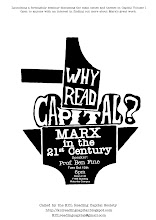Tuesday 16 February 2010
The Working Day
‘The Working Day’.
Tuesday 23rd February
6pm
Room 2.80 F-WB
Waterloo Campus, KCL
“Capital is dead labour, that, vampire-like, only lives by sucking living labour, and lives the more, the more labour it sucks.”
“…in the history of capitalist production, the determination of what is a working-day, presents itself as the result of a struggle, a struggle between collective capital, i.e., the class of capitalists, and collective labour, i.e., the working-class”
N.B. We will be reading chapters 10 in preparation for this discussion.
Monday 8 February 2010
Apologies
KCL Reading Capital
- - -
Jonathan and Gareth's previous works are available at:
Monday 1 February 2010
Valorization and the Labour Process
‘Valorization and the Labour Process: Surplus Value, Constant Capital & Variable Capital’.
Tuesday February 9th
6pm
F-WB 2.80 Waterloo Campus KCL
"A spider conducts operations that resemble those of a weaver, and a bee puts to shame many an architect in the construction of her cells. But what distinguishes the worst architect from the best of bees is this, that the architect raises his structure in imagination before he erects it in reality. At the end of every labour-process, we get a result that already existed in the imagination of the labourer at its commencement."
"That part of capital then, which is represented by the means of production, by the raw material, auxiliary material and the instruments of labour does not, in the process of production, undergo any quantitative alteration of value. I therefore call it the constant part of capital, or, more shortly, constant capital.
On the other hand, that part of capital, represented by labour-power, does, in the process of production, undergo an alteration of value. It both reproduces the equivalent of its own value, and also produces an excess, a surplus-value, which may itself vary, may be more or less according to circumstances. This part of capital is continually being transformed from a constant into a variable magnitude. I therefore call it the variable part of capital, or, shortly, variable capital. The same elements of capital which, from the point of view of the labour-process, present themselves respectively as the objective and subjective factors, as means of production and labour-power, present themselves, from the point of view of the process of creating surplus-value, as constant and variable capital."
